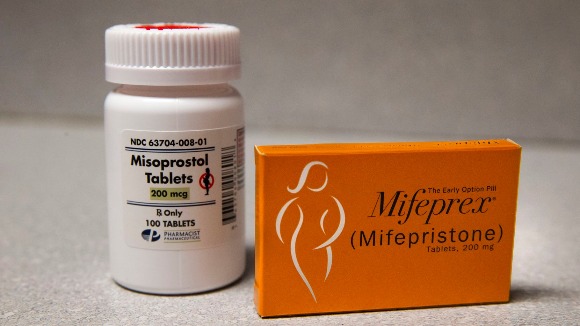What is the abortion pill?
Medication abortion — also called the abortion pill — is a safe and effective way to end an early pregnancy.
How does the abortion pill work?
“Abortion pill” is the common name for using two different medicines to end a pregnancy: mifepristone and misoprostol. First, you take a pill called mifepristone. Pregnancy needs a hormone called progesterone to grow normally. Mifepristone blocks your body’s own progesterone, stopping the pregnancy from growing.
Then you take the second medicine, misoprostol, either right away or up to 48 hours later. This medicine causes cramping and bleeding to empty your uterus. It’s kind of like having a really heavy, crampy period, and the process is very similar to an early miscarriage. If you don’t have any bleeding within 24 hours after taking the second medicine, call us immediately. Our doctor or nurse will give you both medicines at the health center. Our doctor or nurse will give you detailed directions about where, when, and how to take the medicines. You may also get some antibiotics to prevent infection.
How effective is it?

The abortion pill is very effective. The effectiveness depends on how far along you are in your pregnancy when you take the medicine.
- For people who are 8 weeks pregnant or less, it works about 94-98 out of 100 times.
- For people who are 8-9 weeks pregnant, it works about 94-96 out of 100 times.
- For people who are 9-10 weeks pregnant, it works about 91-93 out of 100 times. If you’re given an extra dose of medicine, it works about 99 out of 100 times.
- For people who are 10-24 weeks pregnant, it works about 90 out of 100 times. If you’re given an extra dose of medicine, it works about 98 out of 100 times.
The abortion pill usually works, but if it doesn’t, you can take more medicine or have an in-clinic abortion to complete the abortion.
When can I take the it?
You usually can get a medication abortion up to 77 days (11 weeks) after the first day of your last period. If it has been 78 days or more since the first day of your last period, you can have an in-clinic abortion to end your pregnancy.
Why do people choose medical pills?
Which kind of abortion you choose all depends on your personal preference and situation. With medication abortion, some people like that you don’t need to have a procedure in a doctor’s office. You can have your medication abortion at home or in another comfortable place that you choose. You get to decide who you want to be with during your abortion, or you can go it alone. Because medication abortion is similar to a miscarriage, many people feel like it’s more “natural” and less invasive. Our doctor, nurse, or health center staff can help you decide which kind of abortion is best for you.
ABORTION WITH PILLS
Medication abortion — also called the abortion pill — is a safe and effective way to end an early pregnancy.How does the abortion pill work?
“Abortion pill” is the common name for using two different medicines to end a pregnancy: mifepristone and misoprostol.
First, you take a pill called mifepristone. Pregnancy needs a hormone called progesterone to grow normally. Mifepristone blocks your body’s own progesterone, stopping the pregnancy from growing.Then you take the second medicine, misoprostol, either right away or up to 48 hours later. This medicine causes cramping and bleeding
ABORTION WITH PILLS
Medication abortion — also called the abortion pill — is a safe and effective way to end an early pregnancy.How does the abortion pill work?
“Abortion pill” is the common name for using two different medicines to end a pregnancy: mifepristone and misoprostol.
First, you take a pill called mifepristone. Pregnancy needs a hormone called progesterone to grow normally. Mifepristone blocks your body’s own progesterone, stopping the pregnancy from growing.Then you take the second medicine, misoprostol, either right away or up to 48 hours later. This medicine causes cramping and bleeding
Who Can Take the Abortion Pill?
Not everyone is eligible for the abortion pill, and this section will outline the criteria for those considering this option. The importance of consultation and medical supervision will be emphasized, emphasizing the significance of responsible healthcare practices.
The Emotional Aspect
Beyond the medical aspects, the emotional impact of choosing the abortion pill will be explored. This section will delve into the psychological consequences, the need for support, and the role of counseling during this critical decision-making process.
Comparing with Other Abortion Methods
A comparative analysis of the abortion pill against surgical methods will be provided. Pros and cons of each approach will be discussed, helping readers make informed decisions based on their individual circumstances.

Myths and Facts
Dispelling common misconceptions surrounding the abortion pill is essential for promoting accurate information. Through scientific evidence, this section will debunk myths, ensuring readers have a clear understanding of the facts.
Abortion Pill Access Worldwide
The legal status of the abortion pill varies globally. This section will provide insights into its status in different countries, shedding light on the challenges faced and ongoing advocacy efforts to ensure reproductive rights.
Future Developments and Research
As medical technology advances, so does the landscape of reproductive health. This section will explore current advancements in abortion technology, ongoing studies, and innovations shaping the future of abortion methods.
Personal Stories and Testimonials
Real experiences shared by individuals who have undergone the abortion pill procedure will be presented. This section aims to humanize the topic, fostering empathy and understanding through shared narratives.
Considerations for Women’s Health
The broader implications of reproductive rights on women’s overall health will be discussed. Access to comprehensive healthcare, including family planning services, will be emphasized as a fundamental aspect of women’s well-being.

Conclusion
In conclusion, the abortion pill is a complex topic that demands careful consideration. By addressing the medical, emotional, and social aspects surrounding it, this article aims to empower individuals to make informed decisions about their reproductive health.
FAQs
Q1: Is the abortion pill legal everywhere? A1: The legal status of the abortion pill varies by country. It is essential to be aware of the regulations in your location.
Q2: Are there long-term health risks associated with the abortion pill? A2: Current research suggests that the abortion pill is generally safe, with minimal long-term health risks. However, individual experiences may vary.
Q3: Can I take the abortion pill without consulting a healthcare professional? A3: It is strongly recommended to consult with a healthcare professional before deciding on the abortion pill. They can provide personalized advice based on your health and circumstances.
Q4: How does the abortion pill impact mental health? A4: The emotional impact of the abortion pill varies from person to person. Seeking support and counseling can be beneficial in navigating the emotional aspects.
Q5: What should I do if I experience side effects after taking the abortion pill? A5: If you experience any concerning side effects, contact your healthcare provider immediately for guidance and assistance.
